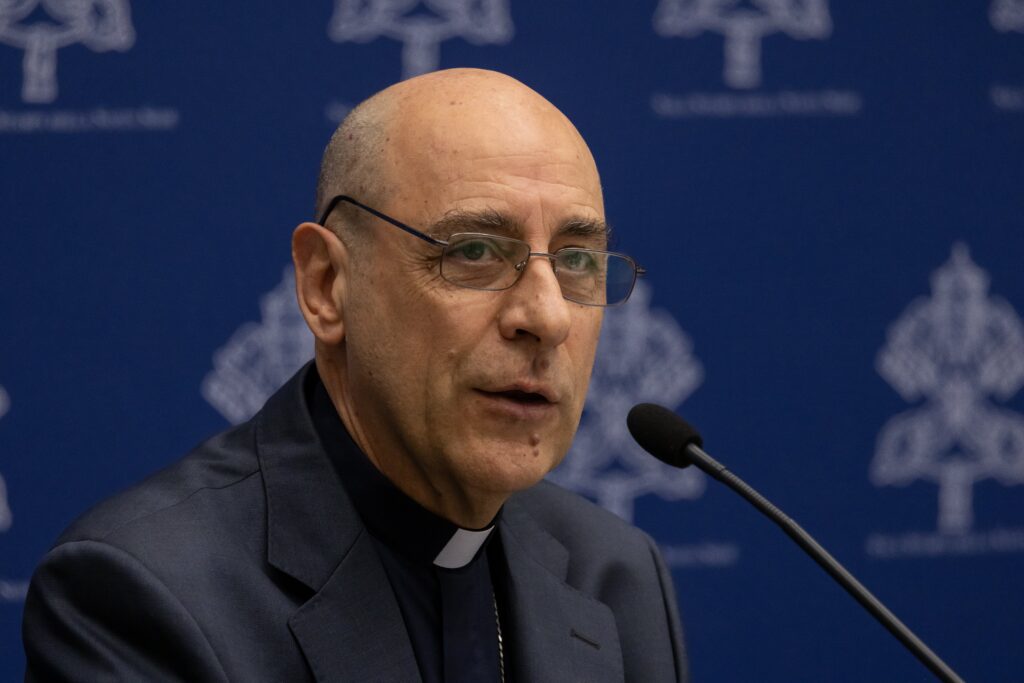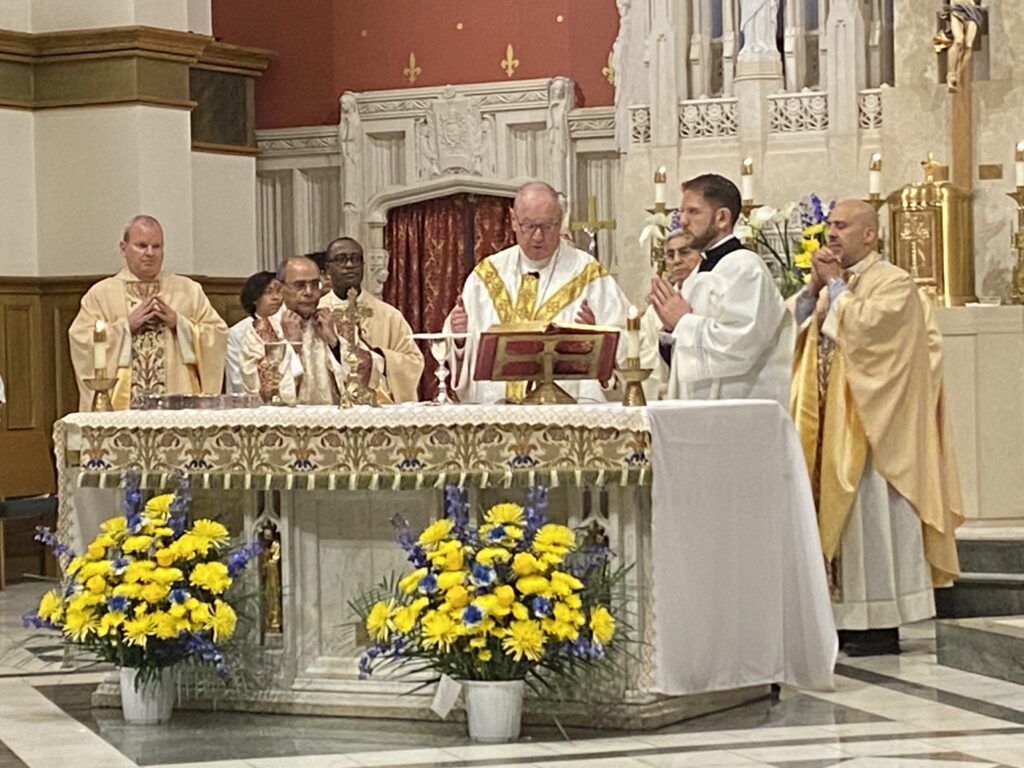
Vatican Says Abortion, Surrogacy, War, Poverty are Attacks on Human Dignity
By: Our Sunday Visitor
The declaration, “Dignitas Infinita” (“Infinite Dignity”), was released at the Vatican on April 8

VATICAN CITY (CNS) — Being a Christian means defending human dignity and that includes opposing abortion, the death penalty, gender transition surgery, war, sexual abuse, and human trafficking, the Dicastery for the Doctrine of the Faith said in a new document.
“We cannot separate faith from the defense of human dignity, evangelization from the promotion of a dignified life and spirituality from a commitment to the dignity of every human being,” Cardinal Víctor Manuel Fernández, dicastery prefect, wrote in the document’s opening section.
The declaration, “Dignitas Infinita” (“Infinite Dignity”), was released at the Vatican April 8.
In the opening section, Cardinal Fernández confirmed reports that a declaration on human dignity and bioethical issues — like abortion, euthanasia and surrogacy — was approved by members of the dicastery in mid-2023 but Pope Francis asked the dicastery to make additions to “highlight topics closely connected to the theme of dignity, such as poverty, the situation of migrants, violence against women, human trafficking, war and other themes.”
In February the cardinals and bishops who are members of the dicastery approved the updated draft of the document, and in late March Pope Francis gave his approval and ordered its publication, Cardinal Fernández said.
With its five years of preparation, he wrote, “the document before us reflects the gravity and centrality of the theme of dignity in Christian thought.”
The declaration noted that the Second Vatican Council’s Pastoral Constitution on the Church in the Modern World also listed attacks on human dignity as ranging from abortion and euthanasia to “subhuman living conditions” and “degrading working conditions.”
Members of the doctrinal dicastery included the death penalty among violations of “the inalienable dignity of every person, regardless of the circumstances” and called for the respect of the dignity of people who are incarcerated.
The declaration denounced discrimination against LGBTQ+ people and particularly situations in which people are “imprisoned, tortured and even deprived of the good of life solely because of their sexual orientation.”
But it also condemned “gender theory” as “extremely dangerous since it cancels differences in its claim to make everyone equal.”
Gender theory, it said, tries “to deny the greatest possible difference that exists between living beings: sexual difference.”
The Catholic Church, the declaration said, teaches that “human life in all its dimensions, both physical and spiritual, is a gift from God. This gift is to be accepted with gratitude and placed at the service of the good.”
Quoting Pope Francis’ exhortation “Amoris Laetitia,” the declaration said gender ideology “envisages a society without sexual differences, thereby eliminating the anthropological basis of the family.”
Dicastery members said it is true that there is a difference between biological sex and the roles and behaviors that a given society or culture assigns to a male or female, but the fact that some of those notions of what it means to be a woman or a man are culturally influenced, does not mean there are no differences between biological males and biological females.
“Therefore,” they said, “all attempts to obscure reference to the ineliminable sexual difference between man and woman are to be rejected.”
Again quoting Pope Francis’ exhortation, the declaration said, “We cannot separate the masculine and the feminine from God’s work of creation, which is prior to all our decisions and experiences, and where biological elements exist which are impossible to ignore.”
“Any sex-change intervention, as a rule, risks threatening the unique dignity the person has received from the moment of conception,” it said. However, the declaration clarified that “this is not to exclude the possibility that a person with genital abnormalities that are already evident at birth or that develop later may choose to receive the assistance of healthcare professionals to resolve these abnormalities.”
Members of the dicastery also warned about the implications of changing language about human dignity, citing for example those who propose the expressions “personal dignity” or “the rights of the person” instead of “human dignity.”
In many cases, they said, the proposal understands “a ‘person’ to be only ‘one who is capable of reasoning.’ They then argue that dignity and rights are deduced from the individual’s capacity for knowledge and freedom, which not all humans possess. Thus, according to them, the unborn child would not have personal dignity, nor would the older person who is dependent upon others, nor would an individual with mental disabilities.”
The Catholic Church, on the contrary, “insists that the dignity of every human person, precisely because it is intrinsic, remains in all circumstances.”
The acceptance of abortion, it said, “is a telling sign of an extremely dangerous crisis of the moral sense, which is becoming more and more incapable of distinguishing between good and evil, even when the fundamental right to life is at stake.”
“Procured abortion is the deliberate and direct killing, by whatever means it is carried out, of a human being in the initial phase of his or her existence, extending from conception to birth,” it said.
The document also repeated Pope Francis’ call for a global ban on surrogacy, which, he said, is “a grave violation of the dignity of the woman and the child, based on the exploitation of situations of the mother’s material needs.”
Surrogacy, it said, transforms a couple’s legitimate desire to have a child into “a ‘right to a child’ that fails to respect the dignity of that child as the recipient of the gift of life.”
Extreme poverty, the marginalization of people with disabilities, violent online attacks and war also violate human dignity, the document said.
While recognizing the right of nations to defend themselves against an aggressor, the document insisted armed conflicts “will not solve problems but only increase them. This point is even more critical in our time when it has become commonplace for so many innocent civilians to perish beyond the confines of a battlefield.”
On the issue of migrants and refugees, the dicastery members said that while “no one will ever openly deny that they are human beings,” many migration policies and popular attitudes toward migrants “can show that we consider them less worthy, less important, less human.”
The promotion of euthanasia and assisted suicide, it said, “utilizes a mistaken understanding of human dignity to turn the concept of dignity against life itself.”
The declaration said, “Certainly, the dignity of those who are critically or terminally ill calls for all suitable and necessary efforts to alleviate their suffering through appropriate palliative care and by avoiding aggressive treatments or disproportionate medical procedures,” but it also insisted, “suffering does not cause the sick to lose their dignity, which is intrinsically and inalienably their own.”
By:
The Good Newsroom
| 12/24/2024
By:
Cardinal Timothy M. Dolan
| 12/24/2024



